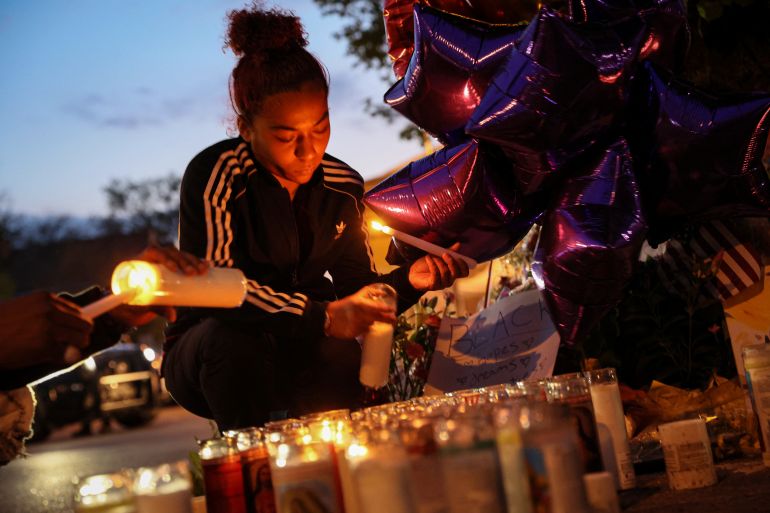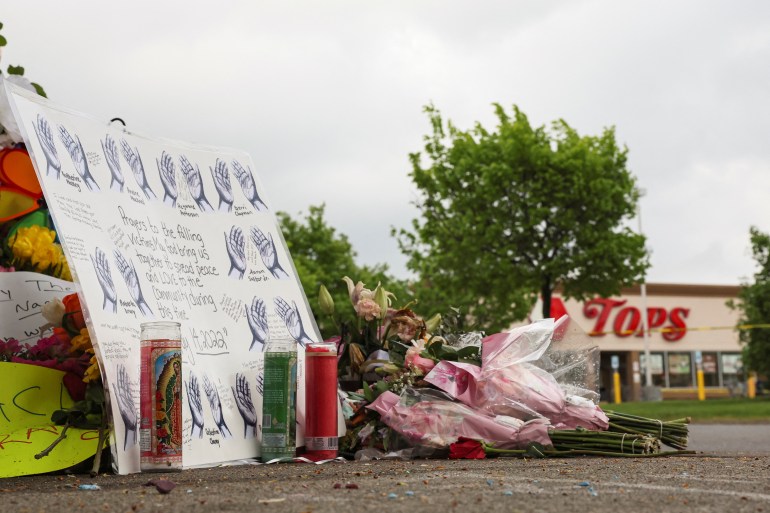Great Replacement: The conspiracy theory stoking racist violence
Roots of white supremacist conspiracy theory are not new, but experts say ‘great replacement’ has become mainstream.

It has been linked to mass shootings in the United States, Canada, and New Zealand; right-wing politicians and media figures have parroted its ideas, and experts say it is becoming increasingly mainstream.
And this week, US President Joe Biden explicitly denounced the so-called “great replacement” conspiracy theory as hateful fuel for deadly violence.
Keep reading
list of 3 itemsWhy is white supremacy growing in the United States?
What the truckers’ convoy revealed about policing in Canada
“I call on all Americans to reject the lie and I condemn those who spread the lie for power, political gain and for profit,” Biden said on Tuesday in Buffalo, New York, where just days earlier a gunman opened fire inside a grocery store in a predominantly Black neighbourhood, killing 10.
A manifesto that US media outlets linked to the accused Buffalo shooter, who authorities have said specifically targeted the area in a racist, anti-Black hate crime, repeatedly referenced the “great replacement” theory.
The white supremacist conspiracy falsely asserts that white people are being replaced and losing their standing in society as a result of a plot to increase non-white immigration, as well as other factors, including birth rates among non-white people.
While experts have said the ideology underpinning the conspiracy is not new, nor is it confined to the US, they have warned in the aftermath of the killings in Buffalo that the “great replacement” theory now holds a prominent place in mainstream discourse.
That is thanks to right-wing politicians, including former President Donald Trump, and popular commentators such as Fox News host Tucker Carlson, repeatedly spreading ideas that lie at the heart of the theory, said Kurt Braddock, an assistant professor in the school of communications at American University in Washington, DC.
“[Trump] used a lot of different kinds of rhetoric that demonised immigrants and really, it echoed a lot of the same kinds of ideas that you hear in the ‘great replacement’ theory,” Braddock told Al Jazeera.
“It’s been brought into the mainstream by the ascension of a populist right wing that has weaponised rhetoric around immigration, and [is] weaponising fear around the idea that white America is being replaced,” he said. “And then normalised by being discussed as though it is a true fact.”
The theory
According to the National Immigration Forum (PDF), the “great replacement” theory “often uses martial and violent rhetoric of a migrant ‘invasion’ that must be stopped before it ‘conquers’ ‘white America’.”
Adherents have sometimes argued the goal is to reduce the political and voting power of white people, and they peddle an anti-Semitic idea that Jewish elites are responsible for the plot, the forum said. “Regardless of which version is referenced, proponents of the ‘great replacement’ theory almost always paint a life-or-death scenario concerning the fate of ‘white America.'”
Several mass shooters in the US have cited the “great replacement” belief or related ideas as reasons they committed their crimes, including the man responsible for a 2018 attack on a synagogue in Pittsburgh that left 11 Jewish congregants dead. And, at a 2017 “Unite the Right” rally in Charlottesville, Virginia, torch-wielding white nationalists chanted, “You will not replace us” and “Jews will not replace us.”
Just more than 55 percent of all hate crimes carried out in the US in 2020 were committed by white offenders, according to Department of Justice data. In 61.8 percent of those cases, race, ethnicity and ancestry were the motivating factors.

But the “great replacement” concept and its deadly consequences go beyond the US alone.
A gunman who killed six Muslim men at a mosque in Quebec City, Canada, in 2017 said he launched his attack over fears refugees would soon be pouring into the country, while the man who killed dozens of worshippers at two mosques in Christchurch, New Zealand, also referenced the “great replacement” theory in his own manifesto. The white nationalist attacker who killed 77 people in Norway more than a decade ago also had a hatred of multiculturalism and said Western civilisation was under attack, primarily from Muslim immigrants.
The term itself was popularised by a 2011 book by far-right French author Renaud Camus, who argued that “the great replacement, the changing of a people … is the most important phenomenon in the history of France for centuries, and likely for always”. In 2019, Austria’s then-Vice Chancellor Heinz-Christian Strache told reporters that “population replacement” in the European country was “a reality that cannot be denied”.
Yet the idea underpinning the theory goes back much further, said Philip Gorski, a sociology and religious studies professor at Yale University, who said that in the US it can be traced back to a white Christian nationalist ideology of the 17th century.
That belief “says that the United States was founded as a Christian nation by white Christians and that it is and should be a nation for white Christians and white Christians are the real Americans”, Gorski told Al Jazeera.
“That’s really the soil that ‘great replacement’ theory fell on,” he said. “And not only did Republican activists and commentators and politicians refuse to uproot ‘great replacement’ theory, a lot of them watered, fertilised and cultivated it for their own gain.”
‘Mainstreaming’ a conspiracy
Indeed, in recent years right-wing politicians and media personalities have spread “great replacement” talking points openly.
Fox News host Carlson, in particular, has been widely denounced for peddling those ideas to his millions of nightly viewers. In a 2021 segment on US immigration policy, Carlson explicitly said President Joe Biden was pursuing “the great replacement, the replacement of legacy Americans with more obedient people from far-away countries” in an effort to gain votes.
Republican congressional candidate JD Vance, Texas Lieutenant Governor Dan Patrick and other GOP officials have shared similar arguments. For instance, Patrick described a group of Haitian asylum seekers that camped out under a bridge on the US-Mexico border last year as an “invasion”.
“A common way of spinning it is to say: ‘Oh it’s a conspiracy to bring in new voters who will be obedient Democrats and undermine the voting power of real Americans,'” said Gorski. “That’s the version of it that Tucker Carlson often disseminates and it’s also a version that a lot of Republican politicians like Elise Stefanik or Marjorie Taylor Greene or Matt Gaetz have been disseminating.
“Another kind of way of putting lipstick on the pig is to say, ‘We’re just defending Christian civilisation, or the Judeo-Christian way of life, or the Western way of life or the traditional American way of life,'” he said.
This month, an Associated Press-NORC Center for Public Affairs Research poll found that nearly one-third of Americans (32 percent) believed “that a group of people is trying to replace native-born Americans with immigrants for electoral gains”.
The same poll also found that 29 percent of respondents had expressed concerns that immigration is causing “native-born Americans” to lose “economic, political, and cultural influence” – the very same concept peddled by believers of the “great replacement” theory.
Rashawn Ray, a senior fellow at the Brookings Institution in Washington, wrote in the aftermath of the Buffalo attack that “it is clear that a growing group of white people are perceiving a group threat regarding their power and status in the racial hierarchy”.
The country must tackle white supremacist ideology if it is to prevent racist hate crimes, he said.
“As President Lyndon B Johnson said, ‘If you can convince the lowest white man he’s better than the best coloured man, he won’t notice you’re picking his pocket. Hell, give him somebody to look down on, and he’ll empty his pockets for you.’ This is the ideology we must address.”